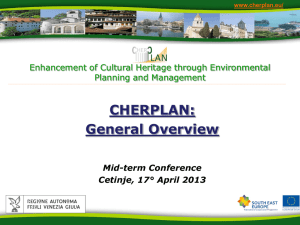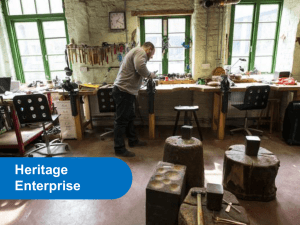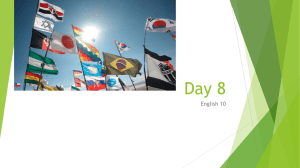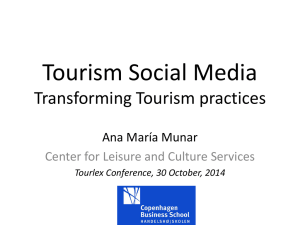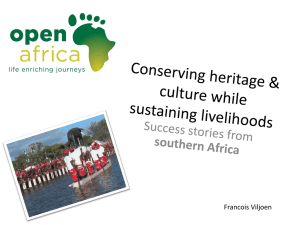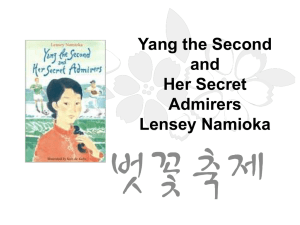ppt - UNEECC
advertisement
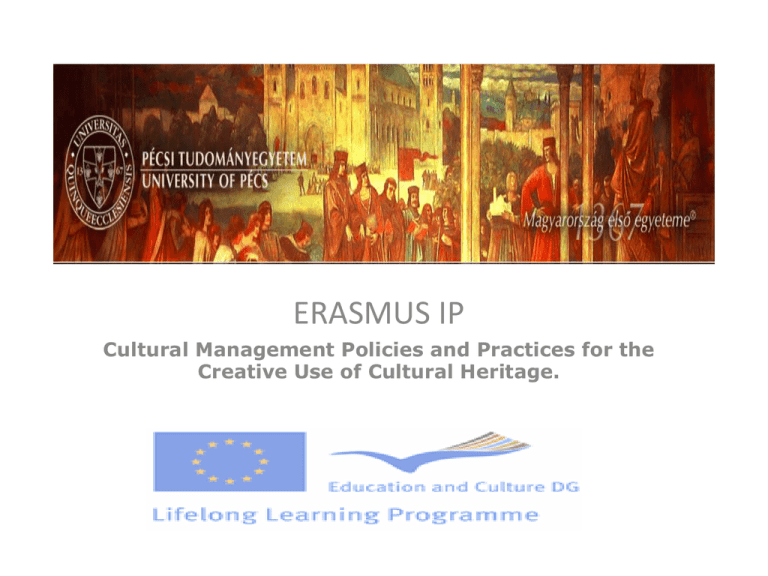
ERASMUS IP Cultural Management Policies and Practices for the Creative Use of Cultural Heritage. In partnership with the University Network of the European Capitals of Culture (UNeECC) • The planned study program intends to bring together approximately 40 students and 10 lecturers representing a wide range of disciplinary fields from 5 countries April 15- 27 2013. PARTNERS • GRAZ: FH JOANNEUM,Univ. of Applied Sciences, Dept. for Management in Tourism • PORTO: UNIVERSIDADE FERNANDO PESSOA, Faculty of Human and Social Sciences, Centre of Cultural Studies, Language and Behaviour • SIBIU: Universitatea „Lucian Blaga” Department of Drama and Theatre Studies • PATRAS:Department of Architecture Engineering Department of Business Management ; Department of Electrical and Computer Engineering; • PÉCS: Faculty of Adult Education and HRD, Institute for Culture European Cultural Management Policies and Practices for the Creative Use of Cultural Heritage • Developing & designing experiences for cultural/ creative tourism • Roles in mapping, defining & building recognition of cultural heritage • Evaluation of Social benefits of cultural heritage projects STUDENTS studying Cultural Studies, Human and Social Sciences, Cultural Economy, Heritage Tourism, Drama and Festival Studies, Cultural Mediation, Architecture and Urban Planning, Computer Engineering, Management and Business Studies are expected from the partner institutions. The innovation aspect Heritage must be kept alive but it must also be allowed to be transformed in response to the needs of the communities of the present day. Creative and innovative uses targeting the local communities and the tourists Holistic Management Approach The innovation aspect City image through the application of new ways of documenting, city mapping that leads to contribution to producing innovative city guides, museum guides, narrative based visitor guides and forms of interactive learning Learning otcomes • Students will have an internationally diverse evidence – based knowledge on cultural and innovative policies and practices • They will become more familiar with the European Capitals of Culture as motors of cultural heritage marketing and cultural tourism development. • They will be able to recognize the importance of cultural heritage as a key to the identity of local communities as well as the regions Learning outcomes They will be able to design a general path of action to safeguard and promote a given cultural heritage in contexts of local development. Students will learn how principles of sustainability may be applied to innovative cultural management and cultural tourism development. They will develop shared concepts and tools: designing and mapping skills of material and immaterial cultural heritage through the use of ICT-tools will be improved Learning activities: Blended methodology -include “impulse lectures” (stimulating), plenary panel inputs, workshops for discussion and design, project works, individual and group presentations, -field trips and study tours to heritage sites. - the students are expected to actively use the web learning platform. This IP’s added value is the possibility of a multidisciplinary approach that may trigger constructive dialogue between the area of Cultural Heritage and that of Digital Humanities, Living Heritage and Heritage Tourism, Creative and Participatory Tourism and Regional and Local Cultural Policy, “Reading” Cities, Creative and Learning City Initiatives, and Effective and Innovative ways of cultural mediation and cutting edge ICT technologies for the public use of Cultural Heritage. Developing & designing experiences for cultural/ creative tourism - Cultural and Urban Tourism: The development and design of cultural tourism products for different types of destinations. (European Capitals of Culture AFTER their one year of prominence using the examples of Graz and Pécs; - Interactive Technology Design. Design of mobile games and stories. Narrative based Mobile Tourist Guides for cities of historic value - Reading the urban reality. Mapping the city. Images of the City: How to make an innovative city guide ? The Thematic Tourism development (educational, cultural, agrotourism, speleological, creative, congress, health, sports, religious.) - New approaches in Heritage Education and Museum Education. Roles in mapping, defining & building recognition of cultural heritage - Material and Immaterial Heritage Relationships with Local Communities and as a form of Social Intervention. Lessons learned from cultural heritage projects. - Mapping of material and immaterial cultural heritage through the use of ICT tools (ex. Interactive maps, films, digital collections, etc). - The use of web based technologies for production of web based content in the field of Cultural heritage. - Cultural Mediators: artists, practitioners, civic groups at the Crossroad of Tradition and Innovation. Evaluation of Social benefits of cultural heritage projects - Exploited and unexploited opportunities in creating a long lasting legacy in culture and tourism. Sustainable initiatives which continue beyond the one year in which a city carries the title of European Cultural Capital. - Culture as a key element in branding a small city as a competitive destination. - Value-Creation Frameworks, Political Frameworks European Capitals of Culture projects; - The Limits and Opportunities for Creative and Learning Cities: the Impacts of Social Conditions and Returns. Delineating the impact of major events (European Capitals of Culture, Art festivals in creating social benefits - Studying users’ interaction with technology. User Experience. for the Measuring Field trips • Cella Septichora: UNESCO World Heritage list in the year 2000 • Zsolnay Cultural Quarter ( culture-led regeneration project of a factory site = flagship project of European Capital of Culture 2010-project) • City of Mohacs - studying the context of "The Busó Festivities = UNESCO Representative List Item of the Intangible Heritage of Humanity ; The perspective and capabilities of community members who contribute to and benefit from the cultural heritage • Field visits • Opportunities to engage in dialogue with local communities, civic activists, cultural practitioners, policy makers. • In the field practices they will meet cultural collective heritage expressions and manifestations and people who preserve, create and renew these. • Cultural mediators and policy practitioners’ role will be captured analysing the communities’ recognition and mapping efforts Project Outcomes • The handbook in E-Book format will be distributed through the channels of the University Network of the European Capitals of Culture. • UneECC offered a publication possibility in its Yearbook. and on its official website where there will be a link to the IP project website. • The IP project website will be a collaborative workspace. • It will function as a long-term platform for the exchange, knowledge sharing and further development of the domain.

